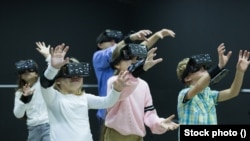Numbering 2 billion and counting, Gen Alpha (born 2010-2024) is expected to be the biggest generation in history. And even though its oldest members are only 14 years old, Gen Alpha is already an economic force to be reckoned with.
“They're spending money, and in significant amounts. Not only that, they influence parental purchasing decisions in a significant way,” says social analyst and demographer Mark McCrindle. “We estimate that the global spend of Generation Alpha direct, and in influence, is $5.5 trillion already, so a pretty phenomenal economic footprint to go with their unsurpassed demographic footprint.”
Its youngest members will make their appearance this year, but the oldest Alphas were born the same year the iPad came out.
As the first entire generation born into the world of smartphones and other connected devices, Alphas have become consumers much earlier than previous generations. That’s thanks, in part, to online forms of payment linked to parental credit cards or other digital currencies. And they’re using that money to buy digital games and accessories.
“They're buying virtual items using virtual currency,” McCrindle says. “So, there's whole new ways of spending and means of spending for this generation that's really leading to that increased commercialization.”
McCrindle says one market that isn’t virtual but is feeling Gen Alpha’s buying power is the cosmetics industry.
For example, visits to Sephora cosmetics stores for the 10-14 age group were up more than 22% from February 2023 through March 2024, over the prior period, according to retail analyst pass_by.
And what appeals to buyers in this age group?
“The sustainability drive may appeal for this demographic, although we can't say that with our data conclusively,” James Ewen, vice president of marketing for pass_by, told VOA via email.
Being born into a digital world means Gen Alpha will likely have excellent technical skills. But what about developing other skills like playing, exploring, collecting and going on adventures that help children learn to understand the world around them?
“The world has shrunk in the big five areas for children, which used to be playground and sport and outdoors and nature and neighborhood,” McCrindle says. “They have become all compressed into a virtual environment.”
Constantly being virtually connected to others can diminish a child’s sense of agency, according to licensed professional counselor Shelly Melia.
“One of the things that being away from your parents, and away from somebody who can instantly solve your problems all the time, is that it causes you to sit with things. It causes you to sit with discomfort. It causes you to struggle. And that's how you grow,” says Melia, who is also a professor in the fields of children's and family ministry at Dallas Baptist University.
“That's how you gain the sense of agency that says, when a problem comes up, ‘Oh, I can solve that.’ Our kids have an over-reliance on what they can do with that phone to solve their problems, rather than what, internally, they can do to solve those problems,” Melia says.
In addition to being the largest generation in history, Gen Alpha is expected to live longer and be more culturally diverse. They’ll also be more educated, live at home longer, and work longer than any generation before them, probably well into their 70s. Two-thirds of Alphas will work in jobs that don’t exist yet, according to the World Economic Forum.
“They're going to be lifelong learners. So, I think to build that solid educational foundation to invest more in that is a good thing,” McCrindle says. “It can delay adulthood. If they stay at home longer, we can end up with the ‘kidult,’ the adults who are still dependent on their parents.”
As adults, Gen Alpha could also face mental health problems, Melia says, because they are likely to be raised by distracted parents, who function in a world where the lines between work and home are increasingly blurred, especially for those who telework.
“Belonging is a real pain point for our kids, and it's hard to feel that sense of belonging in a virtual way. So, we're addicted to something that can't give us what we really need,” Melia says of Gen Alpha and technology.
“They need to feel seen. They need to feel known. And they need to feel loved. And they need some eye contact. They need face-to-face conversation. They need uninterrupted family dinners, those types of things, where they're learning those soft skills or social emotional skills,” she adds.
Generation Alpha will be defined by technology, “almost like the air they breathe,” a sense of empowerment and the ability to drive trends from a young age, and being truly borderless, according to McCrindle.
“It's this global East-to-West influence, not just West-to-East, and I think that with their global connection … and the emergence of the developing world in its influence and innovation, is truly making the world flat and their experience borderless,” says McCrindle, who is credited with naming this generation.
Alpha is the first letter in the Greek alphabet, which he says is appropriate for a generation marking the “beginning of a whole new reality.”
Some thought this generation should be called “Covidians,” but McCrindle says the worldwide pandemic that kept so many Gen Alphas out of school for months, will be a footnote in the life of this generation.







